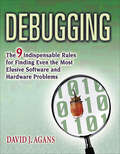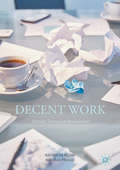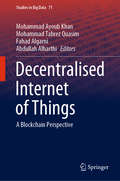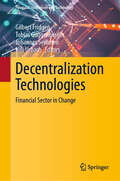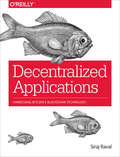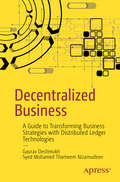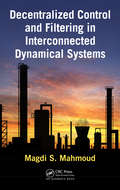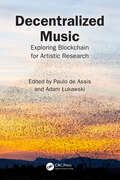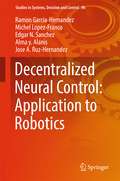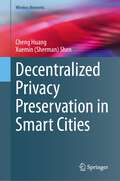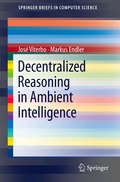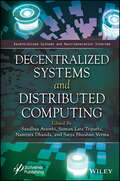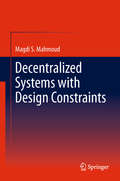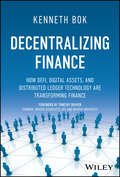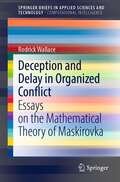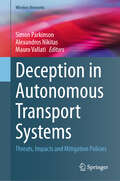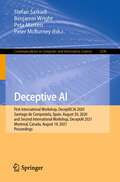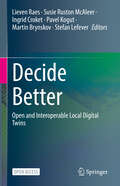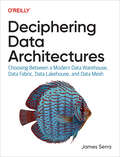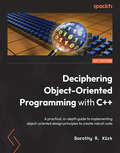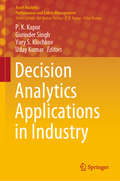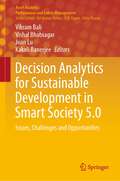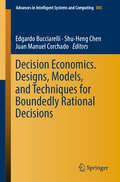- Table View
- List View
Debugging: The 9 Indispensable Rules for Finding Even the Most Elusive Software and Hardware Problems
by David J. AgansWhen the pressure is on to resolve an elusive software or hardware glitch, what&’s needed is a cool head courtesy of a set of rules guaranteed to work on any system, in any circumstance.Written in a frank but engaging style, this book provides simple, foolproof principles guaranteed to help find any bug quickly. Recognized tech expert and author David Agans changes the way you think about debugging, making those pesky problems suddenly much easier to find and fix.Agans identifies nine simple, practical rules that are applicable to any software application or hardware system, which can help detect any bug, no matter how tricky or obscure. Illustrating the rules with real-life bug-detection war stories, Debugging shows you how to:Understand the system: how perceiving the ""roadmap"" can hasten your journeyQuit thinking and look: when hands-on investigation can&’t be avoidedIsolate critical factors: why changing one element at a time can be an essential toolKeep an audit trail: how keeping a record of the debugging process can win the dayWhether the system or program you&’re working on has been designed wrong, built wrong, or used wrong, Debugging helps you think correctly about bugs, so the problems virtually reveal themselves.
Decent Work: Concept, Theory and Measurement
by Narayan Prasad Nausheen NizamiThis book introduces readers to the concept and theories of decent work and provides a framework for measuring it at the micro, meso and macro level in a given country. Further, it addresses the importance of measuring decent work in today's world and in connection with the different challenges countries face depending on their respective stage of development. The essence of the book lies in highlighting the practical applications of decent work in terms of its ability to deliver empirical measurements of qualitative and subjective phenomena with a mixed-methods approach combining tools and techniques from economics and statistics. Moreover, as the applicability of decent work is not confined to the IT industry and formal sectors of the economy, the book also provides useful guidelines on how further empirical studies can be undertaken to measure decent work in non-IT industries. As such, the book offers a rich compilation of empirical and theoretical contributions on decent work designed to not only enrich readers' understanding, but also promote awareness of the practical relevance and technical aspects of the subject matter.
Decentralised Internet of Things: A Blockchain Perspective (Studies in Big Data #71)
by Mohammad Ayoub Khan Mohammad Tabrez Quasim Fahad Algarni Abdullah AlharthiThis book presents practical as well as conceptual insights into the latest trends, tools, techniques and methodologies of blockchains for the Internet of Things. The decentralised Internet of Things (IoT) not only reduces infrastructure costs, but also provides a standardised peer-to-peer communication model for billions of transactions. However, there are significant security challenges associated with peer-to-peer communication. The decentralised concept of blockchain technology ensures transparent interactions between different parties, which are more secure and reliable thanks to distributed ledger and proof-of-work consensus algorithms. Blockchains allow trustless, peer-to-peer communication and have already proven their worth in the world of financial services. The blockchain can be implanted in IoT systems to deal with the issues of scale, trustworthiness and decentralisation, allowing billions of devices to share the same network without the need for additional resources. This book discusses the latest tools and methodology and concepts in the decentralised Internet of Things. Each chapter presents an in-depth investigation of the potential of blockchains in the Internet of Things, addressing the state-of-the-art in and future perspectives of the decentralised Internet of Things. Further, industry experts, researchers and academicians share their ideas and experiences relating to frontier technologies, breakthrough and innovative solutions and applications.
Decentralization Technologies: Financial Sector in Change (Financial Innovation and Technology)
by Nils Urbach Gilbert Fridgen Tobias Guggenberger Johannes SedlmeirThis book connects decentralization technologies with the world of finance and financial services. Increasingly, the financial sector is data-driven, with tensions arising between technical innovations and regulators’ and consumers’ expectations. Fundamentally, financial markets are competitive data markets. The authors of this edited book first identify where changes in the regulatory and business regime give rise to novel requirements and needs for these data markets. Next, the authors introduce three key decentralization technologies –decentralized digital identities, distributed ledger technologies, and federated learning. They discuss privacy-enhancing technologies such as zero-knowledge proofs and illustrate the demands of practical applications. The authors further provide explicit application examples to illustrate where and how these decentralization technologies allow to reflect business, customer, and regulatory requirements amid competitive markets. The volume concludes with an outlook on governance and the sustainability implications of decentralization.
Decentralized Applications: Harnessing Bitcoin's Blockchain Technology
by Siraj RavalTake advantage of Bitcoin’s underlying technology, the blockchain, to build massively scalable, decentralized applications known as dapps. In this practical guide, author Siraj Raval explains why dapps will become more widely used—and profitable—than today’s most popular web apps. You’ll learn how the blockchain’s cryptographically stored ledger, scarce-asset model, and peer-to-peer (P2P) technology provide a more flexible, better-incentivized structure than current software models.Once you understand the theory behind dapps and what a thriving dapp ecosystem looks like, Raval shows you how to use existing tools to create a working dapp. You’ll then take a deep dive into the OpenBazaar decentralized market, and examine two case studies of successful dapps currently in use.Learn advances in distributed-system technology that make distributed data, wealth, identity, computing, and bandwidth possibleBuild a Twitter clone with the Go language, distributed architecture, decentralized messaging app, and peer-to-peer data storeLearn about OpenBazaar’s decentralized market and its structure for supporting transactionsExplore Lighthouse, a decentralized crowdfunding project that rivals sites such as Kickstarter and IndieGogoTake an in-depth look at La’Zooz, a P2P ridesharing app that transmits data directly between riders and drivers
Decentralized Business: A Guide to Transforming Business Strategies with Distributed Ledger Technologies
by Gaurav Deshmukh Syed Mohamed Thameem NizamudeenEmbark on a journey to business evolution grounded in the real-world experiences and challenges faced by those at the forefront of the Web2 revolution. In a landscape where adaptability is paramount, this book is a guiding light amidst a sea of uncertainty. Crafted by seasoned Web2 professionals, it offers a unique perspective on transitioning from traditional cloud computing to decentralized technologies. Delving beyond theory, this book provides actionable insights and strategies to navigate the complexities of Distributed Ledger Technologies (DLTs). Rather than just discussing the implementation of DLTs, it explores the intricacies of execution, offering tangible guidance to facilitate a seamless transition to the decentralized landscape. Moreover, this book doesn't stop at transition—it's a blueprint for thriving in the Web3 era. By offering strategic perspectives and tactical advice, it equips businesses of all sizes to not only survive but flourish in the decentralized economy. Whether you're a startup poised for disruption or an established enterprise seeking innovation, 'Decentralized Business' empowers you to confidently embrace the future. The time for passive observation is over; the future of business is decentralized, and Decentralized Business is your guide to navigating this evolution. Join the ranks of forward-thinkers shaping tomorrow's economy—secure your copy now and begin the journey of transformation and opportunity. What You Will Learn Understand the foundational concepts of DLTs and their relevance to Web2 professionals. Review security considerations and best practices for implementing decentralized solutions. Apply strategies for integrating DLTs into existing cloud-based infrastructures. Who This Book Is For IT managers and executives looking to explore the potential of decentralized solutions; technology consultants advising businesses on digital transformation and cloud-based strategies; professionals and architects are seeking to expand their knowledge into the realm of DLTs
Decentralized Control and Filtering in Interconnected Dynamical Systems
by Magdi S. MahmoudBased on the many approaches available for dealing with large-scale systems (LSS), Decentralized Control and Filtering in Interconnected Dynamical Systems supplies a rigorous framework for studying the analysis, stability, and control problems of LSS. Providing an overall assessment of LSS theories, it addresses model order reduction, parametric un
Decentralized Music: Exploring Blockchain for Artistic Research
by Adam ŁukawskiThis book offers a thorough exploration of the potential of blockchain and AI technologies to transform musical practices. Including contributions from leading researchers in music, arts, and technology, it addresses central notions of agency, authorship, ontology, provenance, and ownership in music.Together, the chapters of this book, often navigating the intersections of post-digital and posthumanist thought, challenge conventional centralized mechanisms of music creation and dissemination, advocating for new forms of musical expression.Stressing the need for the artistic community to engage with blockchain and AI, this volume is essential reading for artists, musicians, researchers, and policymakers curious to know more about the implications of these technologies for the future of music.
Decentralized Neural Control: Application to Robotics
by Ramon Garcia-Hernandez Michel Lopez-Franco Edgar N. Sanchez Alma Y. Alanis Jose A. Ruz-HernandezThis book provides a decentralized approach for the identification and control of robotics systems. It also presents recent research in decentralized neural control and includes applications to robotics. Decentralized control is free from difficulties due to complexity in design, debugging, data gathering and storage requirements, making it preferable for interconnected systems. Furthermore, as opposed to the centralized approach, it can be implemented with parallel processors. This approach deals with four decentralized control schemes, which are able to identify the robot dynamics. The training of each neural network is performed on-line using an extended Kalman filter (EKF). The first indirect decentralized control scheme applies the discrete-time block control approach, to formulate a nonlinear sliding manifold. The second direct decentralized neural control scheme is based on the backstepping technique, approximated by a high order neural network. The third control scheme applies a decentralized neural inverse optimal control for stabilization. The fourth decentralized neural inverse optimal control is designed for trajectory tracking. This comprehensive work on decentralized control of robot manipulators and mobile robots is intended for professors, students and professionals wanting to understand and apply advanced knowledge in their field of work.
Decentralized Privacy Preservation in Smart Cities (Wireless Networks)
by Xuemin (Sherman) Shen Cheng HuangThis book investigates decentralized trust-based privacy-preserving solutions in smart cities. The authors first present an overview of smart cities and privacy challenges and discuss the benefits of adopting decentralized trust models in achieving privacy preservation. The authors then give a comprehensive review of fundamental decentralized techniques and privacy-preserving cryptographic techniques. The next four chapters each detail a decentralized trust-based scheme, focusing respectively on privacy-preserving identity management, cross-domain authentication, data analytics, and data search, in specific use cases. Finally, the book explores open issues and outlines future research directions in the field of decentralized privacy preservation.
Decentralized Reasoning in Ambient Intelligence
by Markus Endler José ViterboIn Ambient Intelligence (AmI) systems, reasoning is fundamental for triggering actions or adaptations according to specific situations that may be meaningful and relevant to some applications. However, such reasoning operations may need to evaluate context data collected from distributed sources and stored in different devices, as usually not all context data is readily available to the reasoners within the system. Decentralized Reasoning in Ambient Intelligence proposes a decentralized reasoning approach for performing rule-based reasoning about context data targeting AmI systems. For this purpose, the authors define a context model assuming context data distributed over two sides: the user side, represented by the users and their mobile devices, and the ambient side, represented by the fixed computational infrastructure and ambient services. They formalize the cooperative reasoning operation -- in which two entities cooperate to perform decentralized rule-based reasoning -- and define a complete process to perform this operation.
Decentralized Systems and Distributed Computing
by Suman Lata Tripathi Satya Bhushan Verma Sandhya Avasthi Namrata DhandaThis book provides a comprehensive exploration of next-generation internet, distributed systems, and distributed computing, offering valuable insights into their impact on society and the future of technology. The use of distributed systems is a big step forward in IT and computer science. As the number of tasks that depend on each other grows, a single machine can no longer handle all of them. Distributed computing is better than traditional computer settings in several ways. Distributed systems reduce the risks of a single point of failure, making them more reliable and able to handle mistakes. Most modern distributed systems are made to be scalable, which means that processing power can be added on the fly to improve performance. The internet of the future is meant to give us freedom and choices, encourage diversity and decentralization, and make it easier for people to be creative and do research. By making the internet more three-dimensional and immersive, the metaverse could introduce more ways to use it. Some people have expressed negative things about the metaverse, and there is much uncertainty regarding its future. Analysts in the field have pondered if the metaverse will differ much from our current digital experiences, and if so, whether people will be willing to spend hours per day exploring virtual space while wearing a headset. This book will look at the different aspects of the next-generation internet, distributed systems, distributed computing, and their effects on society as a whole.
Decentralized Systems with Design Constraints
by Magdi S. MahmoudDecentralized Control and Filtering provides a rigorous framework for examining the analysis, stability and control of large-scale systems, addressing the difficulties that arise because dimensionality, information structure constraints, parametric uncertainty and time-delays. This monograph serves three purposes: it reviews past methods and results from a contemporary perspective; it examines presents trends and approaches and to provide future possibilities; and it investigates robust, reliable and/or resilient decentralized design methods based on a framework of linear matrix inequalities. As well as providing an overview of large-scale systems theories from the past several decades, the author presents key modern concepts and efficient computational methods. Representative numerical examples, end-of-chapter problems, and typical system applications are included, and theoretical developments and practical applications of large-scale dynamical systems are discussed in depth.
Decentralizing Finance: How DeFi, Digital Assets, and Distributed Ledger Technology Are Transforming Finance
by Kenneth BokA Practitioner's Guide to Decentralized Finance (DeFi), Digital Assets, and Distributed Ledger Technology In Decentralizing Finance: How DeFi, Digital Assets and Distributed Ledger Technology Are Transforming Finance, blockchain and digital assets expert Kenneth Bok offers an insightful exploration of the current state of decentralized finance (DeFi). As distributed ledger technology (DLT) increasingly optimizes and democratizes financial ecosystems worldwide, this book serves as a comprehensive guide to the most salient aspects of the ongoing transformation. The text delves into both crypto-native DeFi and DLT applications in regulated financial markets, providing: Comprehensive analysis of crypto-native DeFi across key areas such as its competitive landscape, infrastructure, financial instruments, activities, and applications Coverage of key risks, mitigation strategies, and regulatory frameworks, analyzed through the perspective of international financial standard-setting bodies Insight into how DLT is reshaping traditional financial systems through innovations like central bank digital currencies (CBDCs), tokenized assets, tokenized deposits, and institutional-grade DeFi platforms In a world where financial technology is rewriting the fundamental code of digital currency, the future of money is undeniably DLT-centric. How will this seismic shift interact with existing financial infrastructures? Can decentralization and traditional banking coexist and potentially synergize? This book endeavors to answer these pressing questions for financial professionals navigating these transformative times. Authored by a former Goldman Sachs trader, past Head of Growth at Zilliqa, and an early Ethereum investor with extensive experience in both traditional finance and the crypto ecosystem, Decentralizing Finance provides you with an insider's perspective on the revolution that is DeFi.
Deception and Delay in Organized Conflict: Essays on the Mathematical Theory of Maskirovka (SpringerBriefs in Applied Sciences and Technology)
by Rodrick WallaceThis book explores the role of deception, delay, and self-deception in the dynamics of organized conflict, taking a formal approach that hews closely to the asymptotic limit theorems of information and control theories. The resulting probability models can, with some effort—and some confidence—be converted to statistical tools for the analysis of real-time observational and ‘experimental’ data on institutionalized confrontation across both traditional and emerging ‘Clausewitz Landscapes’.
Deception in Autonomous Transport Systems: Threats, Impacts and Mitigation Policies (Wireless Networks)
by Simon Parkinson Mauro Vallati Alexandros NikitasThis book provides a comprehensive overview of deception in autonomous transport systems. This involves investigating the threats facing autonomous transport systems and how they can contribute towards a deceptive attack, followed by their potential impact if successful, and finally, how they can be mitigated. The work in this book is grouped into three parts. This first part focuses on the area of smart cities, policies, and ethics. This includes critically appraising the trade-off between functionality and security with connected and autonomous vehicles. The second discusses a range of AI applications in the wider field of smart transport and mobility, such as detecting anomalies in vehicle behaviour to investigating detecting disobedient vehicles. Finally, the third part presents and discusses cybersecurity-related aspects to consider when dealing with Connected and Autonomous Vehicles (CAVs) and smart urban infrastructure. This includes analysing different attacks to investigating secure communication technologies. CAVs are a game-changing technology with the potential to transform the way transport is perceived, mobility is serviced, travel ecosystems ‘behave’, and cities and societies as a whole function. There are many foreseen safety, accessibility and sustainability benefits resulting from the adoption of CAVs because of their ability, in theory, to operate error-free and collaboratively, ranging from accident prevention, congestion reduction and decreased carbon emissions to time savings, increased social inclusion, optimised routing, and better traffic control. However, no matter what the expected benefits are, CAVs are at the same time susceptible to an unprecedented number of new digital and physical threats. The severity of these threats has resulted in an increased effort to deepen our understanding of CAVs when it comes to their safety and resilience. In this complex and multi-faceted scenario, this book aims to provide an extensive overview of the risks related to the malicious exploitation of CAVs and beyond, the potential ways in which vulnerabilities can be exploited, prevention and mitigation policies and techniques, and the impact that the non-acceptance of Connected and Autonomous Mobility can have on the Smart City agenda. This book targets researchers, practitioners, and advanced-level students in computer science and transport engineering.
Deceptive AI: First International Workshop, DeceptECAI 2020, Santiago de Compostela, Spain, August 30, 2020 and Second International Workshop, DeceptAI 2021, Montreal, Canada, August 19, 2021, Proceedings (Communications in Computer and Information Science #1296)
by Benjamin Wright Stefan Sarkadi Peta Masters Peter McBurneyThis book constitutes selected papers presented at the First International Workshop on Deceptive AI, DeceptECAI 2020, held in conjunction with the 24th European Conference on Artificial Intelligence, ECAI 2020, in Santiago de Compostela, Spain, in August 2020, and Second International Workshop on Deceptive AI, DeceptAI 2021, held in conjunction with the 30th International Joint Conference on Artificial Intelligence, IJCAI 2021, in Montreal, Canada, in August 2021. Due to the COVID-19 pandemic both conferences were held in a virtual mode. The 12 papers presented were thoroughly reviewed and selected from the 16 submissions. They present recent developments in the growing area of research in the interface between deception and AI.
Decide Better: Open and Interoperable Local Digital Twins
by Martin Brynskov Lieven Raes Susie Ruston McAleer Ingrid Croket Pavel Kogut Stefan LefeverThis is an open access book. Decide Better: Open and Interoperable Local Digital Twins explores the transformative potential of Local Digital Twins (LDTs) in urban governance. The book begins by introducing the concept of LDTs, which create digital replicas of cities or regions, combining real-time data and simulations to inform decision-making. It highlights how LDTs can enhance urban management by fostering collaboration among stakeholders and providing evidence-based insights for policy and operational strategies. The book emphasises the importance of openness, interoperability, and ethical use in LDT development, offering practical guidance for policymakers, urban planners, and technologists. The book is divided into three parts. The first part discusses the foundational principles of LDTs and their role in making cities smarter through data-driven decision-making. The second part focuses on implementing reusable LDT architectures, emphasising standards and interoperability. The final section addresses maximising LDT impact, offering strategies for governance, scalability, and ethical considerations. Drawing from real-world examples and expert insights, the book provides a comprehensive framework for adopting LDTs in diverse urban environments, aiming to advance sustainable and citizen-centric urban development.
Deciphering Data Architectures: Choosing Between a Modern Data Warehouse, Data Fabric, Data Lakehouse, and Data Mesh
by James SerraData fabric, data lakehouse, and data mesh have recently appeared as viable alternatives to the modern data warehouse. These new architectures have solid benefits, but they're also surrounded by a lot of hyperbole and confusion. This practical book provides a guided tour of these architectures to help data professionals understand the pros and cons of each. James Serra, big data and data warehousing solution architect at Microsoft, examines common data architecture concepts, including how data warehouses have had to evolve to work with data lake features. You'll learn what data lakehouses can help you achieve, as well as how to distinguish data mesh hype from reality. Best of all, you'll be able to determine the most appropriate data architecture for your needs. With this book, you'll:Gain a working understanding of several data architecturesLearn the strengths and weaknesses of each approachDistinguish data architecture theory from realityPick the best architecture for your use caseUnderstand the differences between data warehouses and data lakesLearn common data architecture concepts to help you build better solutionsExplore the historical evolution and characteristics of data architecturesLearn essentials of running an architecture design session, team organization, and project success factorsFree from product discussions, this book will serve as a timeless resource for years to come.
Deciphering Object-Oriented Programming with C++: A practical, in-depth guide to implementing object-oriented design principles to create robust code
by Dorothy R. KirkEmbrace object-oriented programming and explore language complexities, design patterns, and smart programming techniques using this hands-on guide with C++ 20 compliant examplesKey FeaturesApply object-oriented design concepts in C++ using direct language features and refined programming techniquesDiscover sophisticated programming solutions with nuances to become an efficient programmerExplore design patterns as proven solutions for writing scalable and maintainable C++ softwareBook DescriptionEven though object-oriented software design enables more easily maintainable code, companies choose C++ as an OO language for its speed. Object-oriented programming in C++ is not automatic – it is crucial to understand OO concepts and how they map to both C++ language features and OOP techniques. Distinguishing your code by utilizing well-tested, creative solutions, which can be found in popular design patterns, is crucial in today's marketplace. This book will help you to harness OOP in C++ to write better code.Starting with the essential C++ features, which serve as building blocks for the key chapters, this book focuses on explaining fundamental object-oriented concepts and shows you how to implement them in C++. With the help of practical code examples and diagrams, you'll learn how and why things work. The book's coverage furthers your C++ repertoire by including templates, exceptions, operator overloading, STL, and OO component testing. You'll discover popular design patterns with in-depth examples and understand how to use them as effective programming solutions to solve recurring OOP problems.By the end of this book, you'll be able to employ essential and advanced OOP concepts to create enduring and robust software.What you will learnQuickly learn core C++ programming skills to develop a base for essential OOP features in C++Implement OO designs using C++ language features and proven programming techniquesUnderstand how well-designed, encapsulated code helps make more easily maintainable softwareWrite robust C++ code that can handle programming exceptionsDesign extensible and generic code using templatesApply operator overloading, utilize STL, and perform OO component testingExamine popular design patterns to provide creative solutions for typical OO problemsWho this book is forProgrammers wanting to utilize C++ for OOP will find this book essential to understand how to implement OO designs in C++ through both language features and refined programming techniques while creating robust and easily maintainable code. This OOP book assumes prior programming experience; however, if you have limited or no prior C++ experience, the early chapters will help you learn essential C++ skills to serve as the basis for the many OOP sections, advanced features, and design patterns.
Decision Analytics Applications in Industry (Asset Analytics)
by Uday Kumar P. K. Kapur Gurinder Singh Yury S. KlochkovThis book presents a range of qualitative and quantitative analyses in areas such as cybersecurity, sustainability, multivariate analysis, customer satisfaction, parametric programming, software reliability growth modeling, and blockchain technology, to name but a few. It also highlights integrated methods and practices in the areas of machine learning and genetic algorithms. After discussing applications in supply chains and logistics, cloud computing, six sigma, production management, big data analysis, satellite imaging, game theory, biometric systems, quality, and system performance, the book examines the latest developments and breakthroughs in the field of science and technology, and provides novel problem-solving methods. The themes discussed in the book link contributions by researchers and practitioners from different branches of engineering and management, and hailing from around the globe. These contributions provide scholars with a platform to derive maximum utility in the area of analytics by subscribing to the idea of managing business through system sciences, operations, and management. Managers and decision-makers can learn a great deal from the respective chapters, which will help them devise their own business strategies and find real-world solutions to complex industrial problems.
Decision Analytics for Sustainable Development in Smart Society 5.0: Issues, Challenges and Opportunities (Asset Analytics)
by Vishal Bhatnagar Joan Lu Vikram Bali Kakoli BanerjeeThis book covers sustainable development in smart society’s 5.0 using data analytics. The data analytics is the approach of integrating diversified heterogeneous data for predictive analysis to accredit innovation, decision making, business analysis, and strategic decision making. The data science brings together the research in the field of data analytics, online information analytics, and big data analytics to synthesize issues, challenges, and opportunities across smart society 5.0. Accordingly, the book offers an interesting and insightful read for researchers in the areas of decision analytics, cognitive analytics, big data analytics, visual analytics, text analytics, spatial analytics, risk analytics, graph analytics, predictive analytics, and analytics-enabled applications.
Decision Economics. Designs, Models, and Techniques for Boundedly Rational Decisions (Advances in Intelligent Systems and Computing #805)
by Shu-Heng Chen Juan Manuel Corchado Edgardo BucciarelliThe special session on Decision Economics (DECON) is a scientific forum held annually, which is focused on sharing ideas, projects, research results, models, and experiences associated with the complexity of behavioural decision processes and socio‐economic phenomena. In 2018, DECON was held at Campus Tecnológico de la Fábrica de Armas, University of Castilla-La Mancha, Toledo, Spain, as part of the 15th International Conference on Distributed Computing and Artificial Intelligence. For the third consecutive year, this book have drawn inspiration from Herbert A. Simon’s interdisciplinary legacy and, in particular, is devoted to designs, models, and techniques for boundedly rational decisions, involving several fields of study and expertise. It is worth noting that the recognition of relevant decision‐making takes place in a range of critical subject areas and research fields, including economics, finance, information systems, small and international business management, operations, and production. Therefore, decision‐making issues are of fundamental importance in all branches of economics addressed with different methodological approaches. As a matter of fact, the study of decision‐making has become the focus of intense research efforts, both theoretical and applied, forming a veritable bridge between theory and practice as well as science and business organisations, whose pillars are based on insightful cutting‐edge experimental, behavioural, and computational approaches on the one hand, and celebrating the value of science as well as the close relationship between economics and complexity on the other. In this respect, the international scientific community acknowledges Herbert A. Simon’s research endeavours to understand the processes involved in economic decision‐making and their implications for the advancement of economic professions. Within the field of decision‐making, indeed, Simon has become a mainstay of bounded rationality and satisficing. His rejection of the standard (unrealistic) decision‐making models adopted by neoclassical economists inspired social scientists worldwide with the purpose to develop research programmes aimed at studying decision‐making empirically, experimentally, and computationally. The main achievements concern decision‐making for individuals, firms, markets, governments, institutions, and, last but not least, science and research. This book of selected papers tackles these issues that Simon broached in a professional career spanning more than sixty years. The Editors of this book dedicated it to Herb.
Decision Economics: Complexity of Decisions and Decisions for Complexity (Advances in Intelligent Systems and Computing #1009)
by Shu-Heng Chen Juan Manuel Corchado Edgardo BucciarelliThis book is based on the International Conference on Decision Economics (DECON 2019). Highlighting the fact that important decision-making takes place in a range of critical subject areas and research fields, including economics, finance, information systems, psychology, small and international business, management, operations, and production, the book focuses on analytics as an emerging synthesis of sophisticated methodology and large data systems used to guide economic decision-making in an increasingly complex business environment.DECON 2019 was organised by the University of Chieti-Pescara (Italy), the National Chengchi University of Taipei (Taiwan), and the University of Salamanca (Spain), and was held at the Escuela politécnica Superior de Ávila, Spain, from 26th to 28th June, 2019. Sponsored by IEEE Systems Man and Cybernetics Society, Spain Section Chapter, and IEEE Spain Section (Technical Co-Sponsor), IBM, Indra, Viewnext, Global Exchange, AEPIA-and-APPIA, with the funding supporting of the Junta de Castilla y León, Spain (ID: SA267P18-Project co-financed with FEDER funds)
Decision Economics: Minds, Machines, and their Society (Studies in Computational Intelligence #990)
by Shu-Heng Chen Edgardo Bucciarelli Juan M. Corchado Javier Parra D.This book is the result of a multi-year research project led and sponsored by the University of Chieti-Pescara, National Chengchi University, University of Salamanca, and Osaka University. It is the fifth volume to emerge from that international project, held under the aegis of the United Nations Academic Impact in 2020. All the essays in this volume were (virtually) discussed at the University of L’Aquila―as the venue of the 2nd International Conference on Decision Economics, a three-day global gathering of approximately one hundred scholars and practitioners—and were subjected to thorough peer review by leading experts in the field. The essays reflect the extent, diversity, and richness of several research areas, both normative and descriptive, and are an invaluable resource for graduate-level and PhD students, academics, researchers, policymakers and other professionals, especially in the social and cognitive sciences. Given its interdisciplinary scope, the book subsequently delivers new approaches on how to contribute to the future of economics, providing alternative explanations for various socio-economic issues such as computable humanities; cognitive, behavioural, and experimental perspectives in economics; data analysis and machine learning as well as research areas at the intersection of computer science, artificial intelligence, mathematics, and statistics; agent-based modelling and the related. The editors are grateful to the scientific committee for its continuous support throughout the research project as well as to the many participants for their insightful comments and always probing questions. In any case, the collaboration involved in the project extends far beyond the group of authors published in this volume and is reflected in the quality of the essays published over the years.
